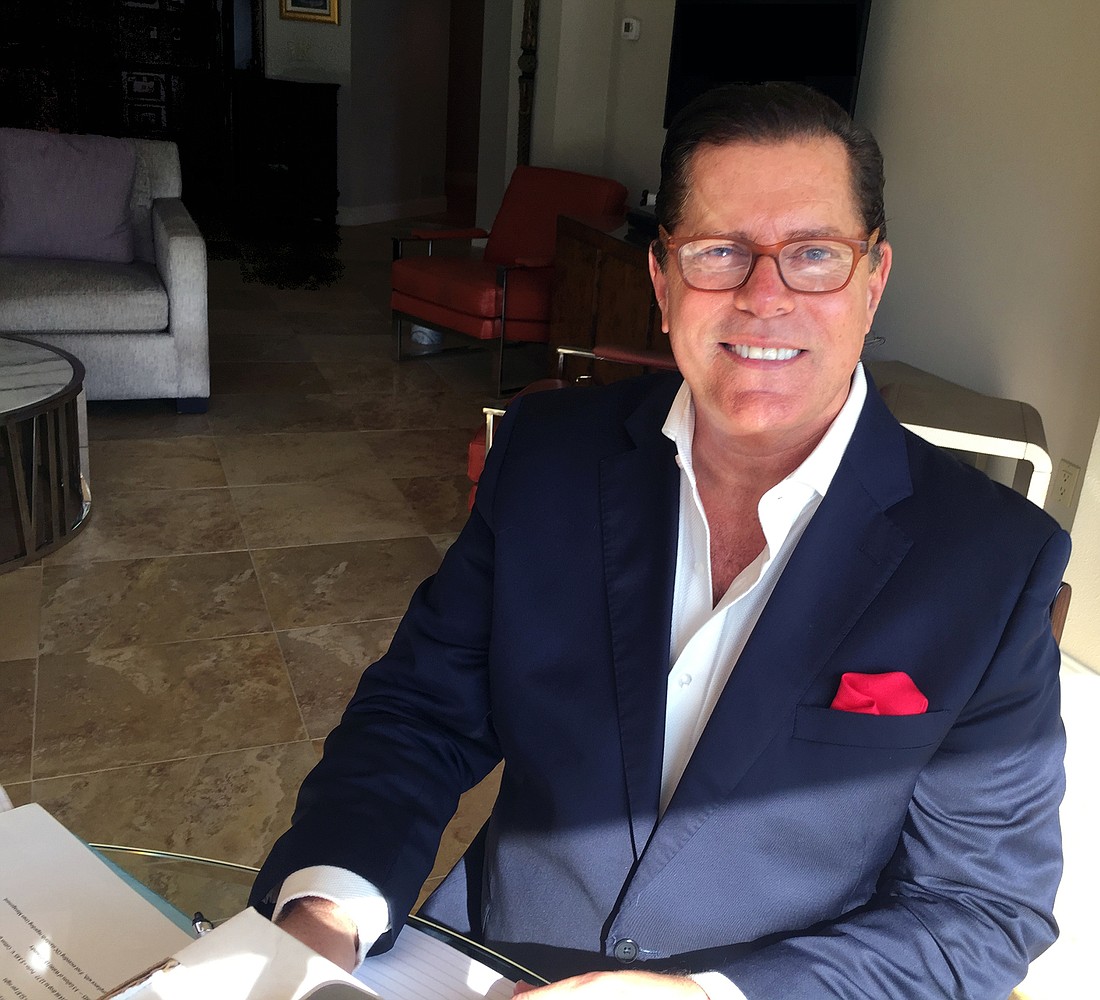- April 8, 2025
-
-
Loading

Loading

Several years ago, Sarasota-based hotelier Richard Ferrell attended a National Geographic conference on water. While watching a presentation, a slide with a single statistic stood out: it takes 2,800 gallons of water to make a queen-sized cotton sheet.
The water use doesn’t end there. “As a hotelier, I knew how much water we were using in washing of sheets,” says Ferrell. Plus, sheets require chemicals to wash, and when hotel sheets have to be replaced, it creates a good amount of waste. It all added up to major environmental impacts and heavy financial and workload burdens on hotels. “I had a hotel management company that I started, and I was a hotel owner as well,” he says. “I was looking for something to do that blended my penchant for conservation and being a good steward for the environment with my knowledge of the hotel industry.”
Through his company Pürlin, the ambitious and bold-thinking Ferrell found what he calls an alternative for the industry. Instead of cotton, he’s working with microfiber, which is often used in activewear. And instead of washing sheets, he’s recycling them through a melting process. Ferrell is rolling out his recyclable linens in Las Vegas hotels and has goals for expansion in other parts of the U.S.
Potential applications, Ferrell believes, could reach beyond hotels to the military, hospitals, senior living facilities and more. To get there, economies of scale will be crucial. “My thought is the idea of having sheets and pillowcases is just the beginning,” says Ferrell. “Wherever there are communal-use linens — hospitals, hotels, cruise ships — we’re going to get to the point where you’re not going to have to use a washcloth, towel, sheet or pillowcase someone else has used.”
Ferrell worked with scientists to develop the process. (He and his partners, through Purlin LLC, have invested more than $2 million in the venture.) Once Pürlin sheets are used in a hotel room, housekeeping removes them from the bed, just like a regular cotton sheet set. Pürlin collects the used sheets and takes them to a recycling facility. There, sheets are melted at 510 degrees into pellets used to make other sheets.
Costs for hotel operators to jettison the traditional method and use Pürlin could be competitive with traditional linen costs or slightly above or below. That could change, too, as Pürlin gains more clients and achieves economies of scale. “We don’t want to be for mid-range to luxury hotels, we really want to be for every hotel,” says Ferrell.
‘As a hotelier, I think the biggest challenge is doing something that’s totally different than the norm. It’s a complete paradigm shift of how communal-use bed linens are handled.’ — Richard Ferrell, Pürlin
Pürlin was ready to roll out products in April — right as the pandemic gained traction in the U.S. “When the hotel situation happened with COVID-19 and hotels shut down, we’re thinking, ‘Wow, this is not going to be a positive situation for us,’” says Ferrell. “But as it turns out, what we created initially to be for water saving also is really good to prevent cross-contamination.” Suddenly, sleeping on crisp, Arctic white sheets no one else has slept on before was a key amenity. In an era of increased health concerns, Ferrell says Pürlin could be a critical tool to encourage guests to stay at hotels
Pürlin did beta testing at Florida hotels, and Ferrell says the trials, over 100, went well. Comfort was key, and he says Pürlin products are akin to 600 to 800 thread-count sheets. Pürlin is launching with sheets and pillowcases, with duvet covers coming out in the second quarter of 2021. Bath linens could also be in the company’s future.
Ferrell has his eyes on the Florida hospitality market, particularly Orlando and the west coast of the state, but first he’s focusing on Las Vegas. He hopes to service some 9,000 Las Vegas hotel rooms by the end of 2021 and be national and global by year three. Pürlin was one of five companies recently named a Lee School Prize winner, awarded by the Lee Business School at University of Nevada, Las Vegas to companies with solutions to improve the hospitality industry.
Pürlin is working with the Lee Prize committee and hotels in Las Vegas to introduce the sheets. “We’re trying to get on board as quickly as possible,” says Ferrell. “They want them in the rooms to attract guests. We want to prove the concept this year, Vegas being the template. Within 18 months, the goal is to replicate it in another market.” Other areas of interest include Los Angeles, Dallas/Houston, Atlanta, the Northeast and Chicago.
Pürlin is using a manufacturing plant in Mexico to make sheets for Las Vegas hotels. In the future, Ferrell plans additional facilities in hub areas.
In Las Vegas, Pürlin is placing tent cards in hotel rooms to explain the uniqueness of the sheets. “It shows the guest that the hotelier is really thinking of their safety and comfort,” says Ferrell. That uniqueness has already led to word-of-mouth promotion for Pürlin. Guests who have slept on the sheets have become brand ambassadors of sorts, going to other hotels and asking, “Do you use Pürlin sheets?”
It’s one indication Pürlin is making inroads — and creating fans — but the steep hurdle of the status quo remains a hurdle. “As a hotelier, I think the biggest challenge is doing something that’s totally different than the norm,” says Ferrell. “It’s a complete paradigm shift of how communal-use bed linens are handled.”